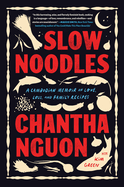
Slow Noodles tells a story that is heart-wrenching, inspiring, harrowing, and mouthwatering. Chantha Nguon's memoir, written with Kim Green, encompasses both world history and an intimate personal account.
Nguon, born the youngest child in a comfortable family in Cambodia's Battambang, had nine years of soft living and good eating before Pol Pot reset time to Year Zero in the 1970s. Moving first to Saigon, where she weathered the end of the Vietnam War, and then escaping as a refugee into Thailand, Nguon gradually lost everyone she loved, ending with her mother's death when Nguon was 23. She was a food-focused young child with a mother who took cooking very seriously; she became a refugee in peril of starvation. For Nguon, rationing or missing entirely the most basic of ingredients is not only a literal life-or-death issue but also symbolically life-altering. With the loss of her family and, to some extent, her culture, she views herself as a repository of recipes, culinary knowledge, memories, pain, and strength.
Food metaphors and recipes enrich this book, which sparkles with poignant, lovely writing: "The green-fresh fragrance of young rice is as lovely and fleeting as childhood itself." Nguon's mother "taught [her] the art of rebelling as quietly as a whisper of silk." By the end of the story, Nguon has transformed into an impressive woman, acting as her husband's equal (a radical concept, encouraged by her quietly rebellious mother) and a fierce advocate for social change.
Slow Noodles is a rare gem of a story, gorgeously written, humble and stirring, and packed with tempting recipes. --Julia Kastner, librarian and blogger at pagesofjulia

